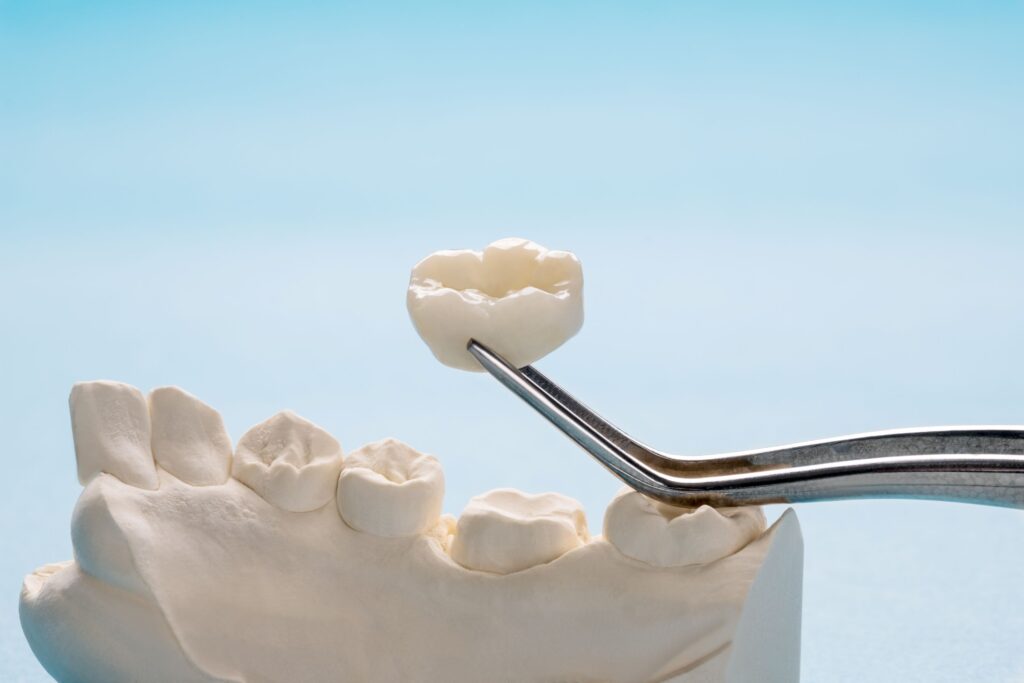
Dental crowns are the tried-and-true method for treating a severely decayed or injured tooth. Usually made from durable porcelain, these prosthetics are bonded over damaged teeth to restore their appearance and functionality while protecting them from additional harm.
Unfortunately, many patients avoid getting dental crowns despite their many benefits because they’re worried it could hurt. Continue reading to learn more about what to expect from getting one of these prosthetics placed and how to care for your mouth afterward!
Does Getting a Dental Crown Hurt?
If you’re avoiding your restorative procedure because you don’t want to undergo unnecessary pain, then you’re in luck! This procedure is minimally invasive and doesn’t require a long recovery period.
Before preparing your teeth, your dentist will apply a local anesthetic to numb unpleasant sensations. Then, they’ll clean your damaged tooth and file away unhealthy enamel so your restoration can fit properly. Next, they’ll make impressions of your mouth that are sent to a special laboratory that starts creating your crown.
Finally, you’ll be fitted with a temporary prosthetic to safeguard your grin until the permanent one is delivered. At that time, we’ll schedule you for a final fitting and cement the cap over your troubled tooth.
Does Dental Crown Recovery Hurt?
These restorations don’t typically cause severe or persistent aches, but you might develop some sensitivity once your prosthetic is placed. Thinning the enamel is known to cause some mild discomfort, and the cement used to bond your crown in place could irritate your gums.
Over-the-counter medications like ibuprofen and Tylenol are usually safe to take and can mitigate any adverse effects. You might also find it helpful to rinse with warm salt water to gently disinfect your mouth and reduce aches and inflammation. Symptoms usually fade after a few days, but if yours persist, contact your dentist to let them know.
How Should I Care for My Dental Crown?
Maintaining your restoration after its placement is critical to maximizing its many benefits. Some standard instructions after your appointment might include:
- Watch what you eat. If you’re tender, avoid overly hard, hot, spicy, or acidic foods that can trigger unpleasant sensations. Also, steer clear of eating anything sticky in the first 24 to 48 hours that might yank it off. You can usually resume eating normally after 2 days.
- Stick to a routine. You should brush and floss twice daily to consistently remove plaque and bacteria buildup that could erode the tooth under your crown and cause it to fail.
- Schedule follow-ups. Visiting your dentist every six months for a routine checkup and cleaning allows them to monitor your dental condition and spot any areas of concern, like a loosening crown, before it can progress into a more serious problem.
Now that you know what to anticipate, you can see there’s no reason to fear restoring your smile with a dental crown!
About the Practice
At Brown, Reynolds, Snow, LeNoir Dentistry, you and the entire family benefit from a team of dentists who are happy to help you improve your oral health. With 40+ years of combined experience, they offer a full array of top-quality services to people of all ages. They take the time to get to know your unique needs and then devise treatment plans tailored to meet them. Then, they utilize state-of-the-art technology to enhance patient comfort while delivering accurate, long-lasting results. If you have an injured tooth that needs attention, you can request an appointment on the website or call (804) 288-5324.


